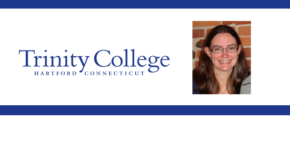 On Trinity College Week: Visual information is important for speech.
On Trinity College Week: Visual information is important for speech.
Elizabeth Casserly, assistant professor of psychology, looks at why it’s not always a good thing.
Elizabeth Casserly began her study of human language and cognition as an undergraduate Linguistics major at Yale University. Since then, she has volunteered as a research assistant for a speech-oriented group of electrical engineers at MIT, worked as a lab manager and researcher on language acquisition for Harvard’s Laboratory for Developmental Studies, and studied speech perception and hearing loss at Indiana University, earning her MA in Linguistics and a joint PhD in Cognitive Psychology and Linguistics.
Vision and Communication
Communication is an extraordinarily complex and amazing cognitive achievement – I am literally transmitting ideas right now from my brain to yours through time, through space, using precise physical movements of muscle and air – but speaking the language you learned as a child typically feels effortless. My research attempts to understand the processes that enable us to produce language so fluently.
I’ve recently been focusing on how the things we sense as we speak contribute to how we talk. That is, under normal conditions I can hear my own voice as I speak. If something happens to disrupt that acoustic feedback – like being in a noisy space – then my speech will change. I’ll speak more loudly, or even shout, so that I can hear myself at the level I would normally expect.
But speech goes beyond just hearing, and we’ve been working on the impact of two other senses: touch, especially within the vocal tract, and vision. Although we’re rarely aware of it, we feel ourselves talking just as much as we hear ourselves, and in our lab we’ve found that if we disrupt that touch sensation – by putting something like Orajel on someone’s lips and tongue, for example – then their speech is impacted, becoming just a little bit less clear.
We’ve also found that visual information – seeing yourself speak in a mirror – has a similar impact. That’s surprising because usually, more sensory information is a good thing. It helps you check up on yourself and make sure you’re saying everything the way you want to, except, apparently, when it’s visual information from a mirror. Right now we’re exploring this result, trying to untangle what’s going on to make mirrors a bad thing for speech. But overall, we’re making progress teasing apart how all of this information comes together to be used in normal, fluent speech communication.

Comments
One response to “Elizabeth Casserly, Trinity College – Vision and Communication”